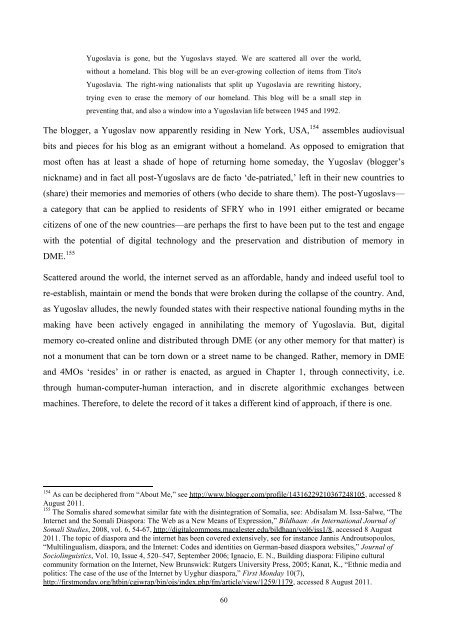UNIVERSITY OF NOVA GORICA GRADUATE SCHOOL ...
UNIVERSITY OF NOVA GORICA GRADUATE SCHOOL ...
UNIVERSITY OF NOVA GORICA GRADUATE SCHOOL ...
You also want an ePaper? Increase the reach of your titles
YUMPU automatically turns print PDFs into web optimized ePapers that Google loves.
Yugoslavia is gone, but the Yugoslavs stayed. We are scattered all over the world,<br />
without a homeland. This blog will be an ever-growing collection of items from Tito's<br />
Yugoslavia. The right-wing nationalists that split up Yugoslavia are rewriting history,<br />
trying even to erase the memory of our homeland. This blog will be a small step in<br />
preventing that, and also a window into a Yugoslavian life between 1945 and 1992.<br />
The blogger, a Yugoslav now apparently residing in New York, USA, 154 assembles audiovisual<br />
bits and pieces for his blog as an emigrant without a homeland. As opposed to emigration that<br />
most often has at least a shade of hope of returning home someday, the Yugoslav (blogger‘s<br />
nickname) and in fact all post-Yugoslavs are de facto ‗de-patriated,‘ left in their new countries to<br />
(share) their memories and memories of others (who decide to share them). The post-Yugoslavs—<br />
a category that can be applied to residents of SFRY who in 1991 either emigrated or became<br />
citizens of one of the new countries—are perhaps the first to have been put to the test and engage<br />
with the potential of digital technology and the preservation and distribution of memory in<br />
DME. 155<br />
Scattered around the world, the internet served as an affordable, handy and indeed useful tool to<br />
re-establish, maintain or mend the bonds that were broken during the collapse of the country. And,<br />
as Yugoslav alludes, the newly founded states with their respective national founding myths in the<br />
making have been actively engaged in annihilating the memory of Yugoslavia. But, digital<br />
memory co-created online and distributed through DME (or any other memory for that matter) is<br />
not a monument that can be torn down or a street name to be changed. Rather, memory in DME<br />
and 4MOs ‗resides‘ in or rather is enacted, as argued in Chapter 1, through connectivity, i.e.<br />
through human-computer-human interaction, and in discrete algorithmic exchanges between<br />
machines. Therefore, to delete the record of it takes a different kind of approach, if there is one.<br />
154 As can be deciphered from ―About Me,‖ see http://www.blogger.com/profile/14316229210367248105, accessed 8<br />
August 2011.<br />
155 The Somalis shared somewhat similar fate with the disintegration of Somalia, see: Abdisalam M. Issa-Salwe, ―The<br />
Internet and the Somali Diaspora: The Web as a New Means of Expression,‖ Bildhaan: An International Journal of<br />
Somali Studies, 2008, vol. 6, 54-67, http://digitalcommons.macalester.edu/bildhaan/vol6/iss1/8, accessed 8 August<br />
2011. The topic of diaspora and the internet has been covered extensively, see for instance Jannis Androutsopoulos,<br />
―Multilingualism, diaspora, and the Internet: Codes and identities on German-based diaspora websites,‖ Journal of<br />
Sociolinguistics, Vol. 10, Issue 4, 520–547, September 2006; Ignacio, E. N., Building diaspora: Filipino cultural<br />
community formation on the Internet, New Brunswick: Rutgers University Press, 2005; Kanat, K., ―Ethnic media and<br />
politics: The case of the use of the Internet by Uyghur diaspora,‖ First Monday 10(7),<br />
http://firstmonday.org/htbin/cgiwrap/bin/ojs/index.php/fm/article/view/1259/1179, accessed 8 August 2011.<br />
60

















